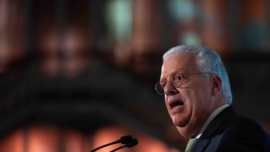The European Union will try to send a mission to Mozambique to support military training similar to the one it has in the Sahel, the head of European diplomacy said on Thursday in Brussels, voicing growing concern over the situation in Cabo Delgado.
The EU’s High Representative for Foreign Affairs and Security Policy, Josep Borrell, anticipating the issues being discussed by the 27 Defence Ministers, said that particular attention would be paid to “what is happening on the border between Ukraine and Russia”, to “the situation in the Sahel, which is not improving”, and also to “another issue, increasingly worrying, which is Mozambique”.
“The Mozambican government has asked for help. We will try to send a [EU] training mission, like the one we have in the Sahel, in order to contain the security situation in Mozambique,” Mr Borrell said.
Pointing out that the main item on the agenda at today’s meeting of defence ministers – at which Portugal is represented by Minister João Gomes Cravinho – is the so-called Strategic Compass, the High Representative pointed out that the discussion will focus on crisis management and on how to improve the effectiveness of EU missions and operations in different arenas, then going back to the issue of Mozambique.
“The Sahel is one case, now we are looking at the possibility of extending it to Mozambique,” he said, adding that the Strategic Compass is how the 27 are seeking to “bring together a common understanding of the challenges that Europeans are facing”.
“Believe me, these challenges are increasing and getting worse. That is why we are going to have a very important Council of defence ministers today,” he concluded in his remarks as he entered the meeting.
At a meeting of EU heads of diplomacy held on 19 April in Brussels, the Portuguese foreign minister said that it was “absolutely essential” and “absolutely urgent” to “strengthen the peace and security component” in the EU-Mozambique relationship, after a meeting with his European counterparts.
Stressing that EU foreign policy is “carried out in three complementary dimensions” – “cooperation for development, humanitarian action and cooperation in peace and security” -, Santos Silva noted that the first two dimensions “are already underway”, but that their increase “requires indispensable security conditions”.
In this regard, the head of Portuguese diplomacy said that, during the meeting, Josep Borrell “raised” the issue of the decision-making process for a mission to support military training in Mozambique, which led to a “political discussion”, stressing that “the presence of foreign troops on Mozambican territory to combat the terrorist networks that unfortunately operate in Cabo Delgado has never been, and is not, in question”.
“The possibility of materialising this increase in cooperation in the area of security through a non-executive mission aimed at the military training of Mozambican special troops has always been and is in question,” he said.
According to the agenda of this Foreign Affairs Council on Defence, Josep Borrell will brief the 27 on various current issues on the international scene, including “Sahel, Ukraine, Mozambique and Operation Irini” in the Mediterranean.
The meeting agenda also includes a discussion on the so-called Strategic Compass – a priority of the Portuguese presidency of the EU Council – more specifically on the crisis management pillar, and a debate on the European Union’s relations with NATO, in which the Secretary General of the Atlantic Alliance, Jens Stoltenberg, will take part.




















